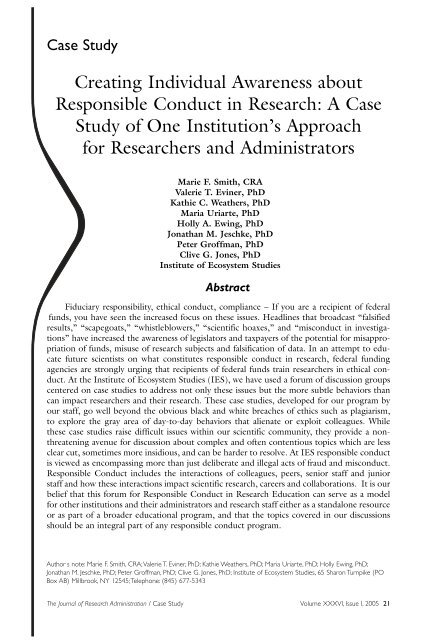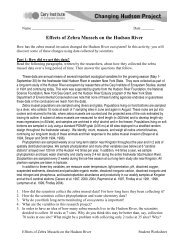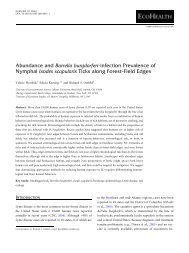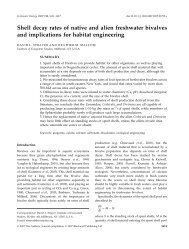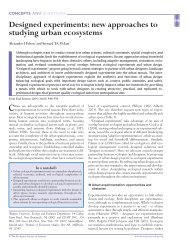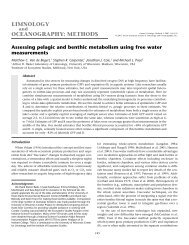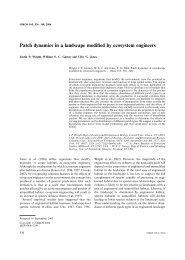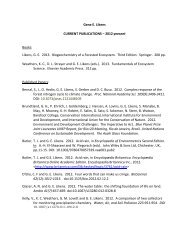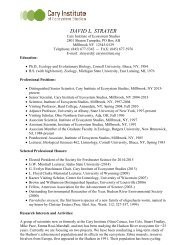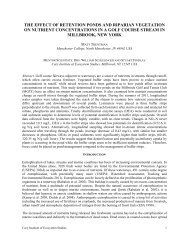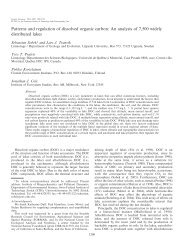Marie F. Smith, CRA;Valerie T. Eviner, PhD - Cary Institute of ...
Marie F. Smith, CRA;Valerie T. Eviner, PhD - Cary Institute of ...
Marie F. Smith, CRA;Valerie T. Eviner, PhD - Cary Institute of ...
You also want an ePaper? Increase the reach of your titles
YUMPU automatically turns print PDFs into web optimized ePapers that Google loves.
Case Study<br />
Creating Individual Awareness about<br />
Responsible Conduct in Research: A Case<br />
Study <strong>of</strong> One Institution’s Approach<br />
for Researchers and Administrators<br />
<strong>Marie</strong> F. <strong>Smith</strong>, <strong>CRA</strong><br />
<strong>Valerie</strong> T. <strong>Eviner</strong>, <strong>PhD</strong><br />
Kathie C. Weathers, <strong>PhD</strong><br />
Maria Uriarte, <strong>PhD</strong><br />
Holly A. Ewing, <strong>PhD</strong><br />
Jonathan M. Jeschke, <strong>PhD</strong><br />
Peter Gr<strong>of</strong>fman, <strong>PhD</strong><br />
Clive G. Jones, <strong>PhD</strong><br />
<strong>Institute</strong> <strong>of</strong> Ecosystem Studies<br />
Abstract<br />
Fiduciary responsibility, ethical conduct, compliance – If you are a recipient <strong>of</strong> federal<br />
funds, you have seen the increased focus on these issues. Headlines that broadcast “falsified<br />
results,” “scapegoats,” “whistleblowers,” “scientific hoaxes,” and “misconduct in investigations”<br />
have increased the awareness <strong>of</strong> legislators and taxpayers <strong>of</strong> the potential for misappropriation<br />
<strong>of</strong> funds, misuse <strong>of</strong> research subjects and falsification <strong>of</strong> data. In an attempt to educate<br />
future scientists on what constitutes responsible conduct in research, federal funding<br />
agencies are strongly urging that recipients <strong>of</strong> federal funds train researchers in ethical conduct.<br />
At the <strong>Institute</strong> <strong>of</strong> Ecosystem Studies (IES), we have used a forum <strong>of</strong> discussion groups<br />
centered on case studies to address not only these issues but the more subtle behaviors than<br />
can impact researchers and their research. These case studies, developed for our program by<br />
our staff, go well beyond the obvious black and white breaches <strong>of</strong> ethics such as plagiarism,<br />
to explore the gray area <strong>of</strong> day-to-day behaviors that alienate or exploit colleagues. While<br />
these case studies raise difficult issues within our scientific community, they provide a nonthreatening<br />
avenue for discussion about complex and <strong>of</strong>ten contentious topics which are less<br />
clear cut, sometimes more insidious, and can be harder to resolve. At IES responsible conduct<br />
is viewed as encompassing more than just deliberate and illegal acts <strong>of</strong> fraud and misconduct.<br />
Responsible Conduct includes the interactions <strong>of</strong> colleagues, peers, senior staff and junior<br />
staff and how these interactions impact scientific research, careers and collaborations. It is our<br />
belief that this forum for Responsible Conduct in Research Education can serve as a model<br />
for other institutions and their administrators and research staff either as a standalone resource<br />
or as part <strong>of</strong> a broader educational program, and that the topics covered in our discussions<br />
should be an integral part <strong>of</strong> any responsible conduct program.<br />
Author s note: <strong>Marie</strong> F. <strong>Smith</strong>, <strong>CRA</strong>;<strong>Valerie</strong> T. <strong>Eviner</strong>, <strong>PhD</strong>; Kathie Weathers, <strong>PhD</strong>; Maria Uriarte, <strong>PhD</strong>; Holly Ewing, <strong>PhD</strong>;<br />
Jonathan M. Jeschke, <strong>PhD</strong>; Peter Gr<strong>of</strong>fman, <strong>PhD</strong>; Clive G. Jones, <strong>PhD</strong>; <strong>Institute</strong> <strong>of</strong> Ecosystem Studies, 65 Sharon Turnpike (PO<br />
Box AB) Millbrook, NY 12545;Telephone: (845) 677-5343<br />
The Journal <strong>of</strong> Research Administration / Case Study Volume XXXVI, Issue I, 2005 21
Introduction<br />
Scientific research is increasingly being<br />
conducted in the public spotlight and the<br />
public is <strong>of</strong>ten frustrated by conflicting scientific<br />
results. The confusing stream <strong>of</strong><br />
information surrounding a research topic<br />
<strong>of</strong>ten provides an example <strong>of</strong> science working<br />
properly since the accumulation <strong>of</strong> new<br />
data <strong>of</strong>ten leads to a new interpretation <strong>of</strong><br />
existing results. Other times, new methods<br />
and data display earlier honest mistakes in<br />
the scientific approach taken to address an<br />
issue. But reversals in scientific knowledge<br />
due to deliberately misleading data are very<br />
damaging to the image <strong>of</strong> science. The public<br />
finds these types <strong>of</strong> reversals disquieting<br />
and begins questioning the expenditure <strong>of</strong><br />
tax dollars on research. Furthermore, misconduct<br />
in any field <strong>of</strong> study can taint public<br />
trust <strong>of</strong> scientific research and delay<br />
implementation <strong>of</strong> policy on critical issues<br />
such as preventing the release <strong>of</strong> toxins into<br />
the environment or mitigation <strong>of</strong> global climate<br />
change.<br />
Behavioral misconduct toward colleagues<br />
also impedes the progression <strong>of</strong> science<br />
and the participation <strong>of</strong> people from<br />
traditionally underrepresented groups.<br />
Many scientists are discouraged or quit<br />
because they encounter undue hostility<br />
towards novel ideas, exploitation <strong>of</strong> subordinates,<br />
co-option <strong>of</strong> other’s ideas, or alienation<br />
<strong>of</strong> people in differing lifestyle, gender,<br />
race or cultural identity. The “relaxed”<br />
nature <strong>of</strong> the scientific enterprise <strong>of</strong>ten facilitates<br />
misconduct.<br />
Responsible research has been defined<br />
(Steneck and Zinn 2003) as research built<br />
on commitment to important values, which<br />
include honesty, accuracy, efficiency, and<br />
objectivity. These values define the meaning<br />
<strong>of</strong> integrity in research. Responsible conduct<br />
should be a determinant in how<br />
research is performed and the practices that<br />
are followed. In order to infuse the research<br />
and education process with ethical, responsible<br />
behavior, both individuals and communities<br />
must explore and identify their<br />
own ethical values.<br />
Federal agencies and institutions share<br />
the responsibility for the research process<br />
and provide guidelines on responsible conduct<br />
through laws, institutional practices,<br />
non-binding codes and guidelines <strong>of</strong> pr<strong>of</strong>essional<br />
organizations. However, the enforcement<br />
<strong>of</strong> expectations for responsible conduct<br />
ultimately relies on individual<br />
researchers and the community dynamics<br />
they create. For example, research mentors<br />
impart their perspectives and values to their<br />
mentees through interactions in their laboratory<br />
groups—behavior that may never be<br />
consciously examined but that may play a<br />
large role in the development <strong>of</strong> interactions<br />
among mentees. Because <strong>of</strong> this, federal<br />
agencies are strongly advocating that individual<br />
institutions be responsible for educating<br />
their employees on what constitutes<br />
responsible conduct and strongly encourage<br />
researchers, both seasoned and new, to participate<br />
in these programs. One <strong>of</strong> the first<br />
topics <strong>of</strong> discussion at IES focused on mentoring<br />
relationships, and later discussions<br />
touched on how mentoring relationships<br />
can either positively or negatively impact<br />
young scientists and their careers. The case<br />
studies were designed to foster discussions<br />
on positive and negative mentoring practices,<br />
how individuals behave in power situations,<br />
and the impact <strong>of</strong> these practices and<br />
behaviors.<br />
IES Approach<br />
to Ethics Education<br />
Institutions bear the responsibility <strong>of</strong><br />
providing education that raises the awareness<br />
<strong>of</strong> both neophyte and seasoned<br />
researchers to recognize behaviors that can<br />
negatively impact collaborations, on any and<br />
every level, and suggest ways <strong>of</strong> overcoming<br />
and dealing with these behaviors. Providing<br />
education on Responsible Conduct in<br />
Research (RCR) has been a challenge for<br />
some institutions because <strong>of</strong> limited<br />
resources, limited funds, and staff availability.<br />
This important topic needs to be presented<br />
in a manner that will capture the<br />
attention <strong>of</strong> the research staff, serve as a catalyst<br />
for bringing to light unproductive<br />
undercurrents, and facilitate productive discussions<br />
that will uncover and begin to<br />
resolve conflicts. Regardless <strong>of</strong> the size <strong>of</strong><br />
22 Volume XXXVI, Issue I, 2005 The Journal <strong>of</strong> Research Administration / Case Study
the institution, there are always resources,<br />
such as staff expertise or online resources,<br />
available to educate the staff about existing<br />
problems and potential solutions. Sometimes<br />
it is just a matter <strong>of</strong> being creative in<br />
the use <strong>of</strong> these resources.<br />
Methods to provide responsible conduct<br />
in research training range from full courses<br />
to single classes and discussion units. During<br />
the 2003-2004 academic year the, <strong>Institute</strong><br />
<strong>of</strong> Ecosystem Studies utilized an existing<br />
discussion group forum to meet monthly<br />
and present case studies for discussion. A<br />
mix <strong>of</strong> postdocs, staff scientists, research<br />
assistants, and members <strong>of</strong> the administrative<br />
staff attended the discussions and presented<br />
varied reactions to and perspectives<br />
on the problems presented in the case studies.<br />
These case studies were, for the most<br />
part, written by a cross section <strong>of</strong> IES<br />
research and administrative staff and were<br />
based on the premise that responsible conduct<br />
goes deeper than plagiarism, falsification<br />
<strong>of</strong> data or theft <strong>of</strong> ideas. They were<br />
designed to delve into core individual values<br />
and how they shape research interactions<br />
and to explore the institutional role in the<br />
process. A basic premise was that irresponsible<br />
conduct could severely hamper scientific<br />
progress.<br />
The goal in providing a series <strong>of</strong> discussions<br />
on RCR was to provide more than a<br />
course in ethics. It was to give staff members<br />
an open forum to examine, share and<br />
discuss problems and concerns. The discussions<br />
made the IES community aware <strong>of</strong><br />
how behaviors negatively and positively<br />
impact collaborative relationships. They also<br />
made us aware <strong>of</strong> how important it is to<br />
examine and re-examine these interactions<br />
so that the parties involved do not lose sight<br />
<strong>of</strong> how their actions and interactions affect<br />
each other and the project.<br />
Most <strong>of</strong> the case studies (available at<br />
http://www.ecostudies.org/responsible_conduct.html;<br />
see Appendix) were specifically<br />
designed to be thought provoking by focusing<br />
on the nuances <strong>of</strong> human interactions<br />
rather than the more obvious and deliberate<br />
instances <strong>of</strong> misconduct. In particular, the<br />
case studies written by IES research and/or<br />
administrative staff were designed to delve<br />
into the ways in which individual values<br />
shape research interactions. As a secondary<br />
goal, many case studies were written to<br />
encourage discussion <strong>of</strong> institutional<br />
responsibilities not only in setting guidelines<br />
for behavior but also in the development <strong>of</strong><br />
an atmosphere <strong>of</strong> trust and respect. These<br />
case studies left the reader free to interpret<br />
the problems and behaviors <strong>of</strong> the individual<br />
characters and led to many honest<br />
debates on how the problems should be<br />
addressed and solved. The participants <strong>of</strong>ten<br />
discussed similar situations in their own<br />
careers and the impact that the behaviors or<br />
problems that they had with mentors or colleagues<br />
had or could have had on their<br />
research or their careers. Often the discussions<br />
were insightful and stimulating, and all<br />
discussions continued beyond the scheduled<br />
meeting time. The reactions <strong>of</strong> participants<br />
depended in part on their experience; some<br />
considered the discussions new and interesting,<br />
while others who had been in situations<br />
similar to those in the case studies <strong>of</strong>ten<br />
found the discussions painful or frustrating.<br />
The most positive aspect to these discussions<br />
was the opportunity to discuss problematic<br />
topics more openly in a somewhat<br />
neutral setting. To the extent that these case<br />
studies might open awareness among scientists,<br />
staff and administrators, they can be<br />
used as a somewhat neutral vehicle for<br />
exploration <strong>of</strong> difficult topics. In the longterm,<br />
only self-examination <strong>of</strong> personal values<br />
and prejudices can change individual<br />
behavior and contribute to ethical behavior<br />
within a community.<br />
A common theme throughout many <strong>of</strong><br />
the case studies was how individuals, colleagues,<br />
and institutions should cope with<br />
cases <strong>of</strong> misconduct in which one powerful<br />
individual hampers the welfare <strong>of</strong> another<br />
with less status. Cases ranged from cooption<br />
<strong>of</strong> ideas, improper attribution <strong>of</strong> coauthorship,<br />
and sexual or racial discrimination.<br />
In all cases, it was clear that power<br />
inequalities exist not only among colleagues<br />
at different career stages, but also within the<br />
same career stage, when one wields more<br />
political power within the field or institution.<br />
Many participants agreed that in situations<br />
with power imbalances, the person on<br />
The Journal <strong>of</strong> Research Administration / Case Study Volume XXXVI, Issue I, 2005 23
the losing end was most likely to accept the<br />
loss and move on, because attempts by<br />
them, or on their behalf, to question the<br />
behavior <strong>of</strong> a more powerful colleague<br />
could further jeopardize their career and<br />
reputation.<br />
Repeated discussions on this topic made<br />
it clear that in order to enforce ethical conduct<br />
among colleagues and create an atmosphere<br />
that is fair and just, it is essential for<br />
the overall community to use peer pressure<br />
on their misbehaving colleagues, and to<br />
stand behind those who have been placed at<br />
a disadvantage by those in power. Institutional<br />
authorities need to be very clear that<br />
damaging behaviors will not be tolerated,<br />
and they need to provide a clear course <strong>of</strong><br />
action for conflict resolution.<br />
Communication<br />
Is the First Step<br />
The many discussions emphasized the<br />
fact that difficult issues <strong>of</strong> personal conduct<br />
in scientific research are best addressed<br />
through clear communication among all<br />
participants, their supervisors, and institutional<br />
administrators. Effective communication<br />
can be successful only in an atmosphere<br />
<strong>of</strong> trust, openness, and respect. The lines <strong>of</strong><br />
open and honest communication are <strong>of</strong>ten<br />
intentionally closed because academics are<br />
<strong>of</strong>ten too busy to discuss topics that require<br />
a great deal <strong>of</strong> time, thought, and energy<br />
and because the topics are not considered to<br />
be immediately contributing to their career<br />
productivity, even though these issues are<br />
<strong>of</strong>ten central in the longer term.<br />
In many <strong>of</strong> the case studies, participants<br />
perceived the situations differently, and<br />
those differences in perception led to differing<br />
opinions about the correct course <strong>of</strong><br />
action. Discussion <strong>of</strong> these topics made participants<br />
aware <strong>of</strong> how some seemingly<br />
innocent behaviors could have harmful<br />
effects on some members <strong>of</strong> the community.<br />
For example, when a powerful leader in a<br />
scientific discipline makes sexual advances<br />
towards a younger colleague at a meeting, it<br />
is not simply a matter <strong>of</strong> the person’s “having<br />
fun,” because more <strong>of</strong>ten than not, the<br />
younger colleague feels de-valued for their<br />
scientific accomplishments and worries that<br />
their responses to these advances could<br />
jeopardize their career in a system based on<br />
peer review by influential members <strong>of</strong> the<br />
field. The outcomes <strong>of</strong> the discussions<br />
emphasized that one should be careful not<br />
to make assumptions about other people’s<br />
perceptions; a clear understanding <strong>of</strong> a situation<br />
requires a dialogue between the parties<br />
involved. One <strong>of</strong> the most enlightening<br />
and surprising revelations <strong>of</strong> the discussions<br />
was the fact that, although some staff members<br />
had worked side by side for over 15<br />
years, they were unaware <strong>of</strong> how their coworkers<br />
would respond to or felt about<br />
many <strong>of</strong> the issues. On more than one occasion<br />
one person would say, “The answer to<br />
that is simple and obvious; it is this,” while<br />
another participant would say, “I, too,<br />
thought the answer was obvious, but it was<br />
not this; it is definitely that.”<br />
Conclusion<br />
The goal <strong>of</strong> the discussions was for IES<br />
to respond to an institutional and national<br />
need to identify institutional problem areas<br />
regarding responsible conduct in research,<br />
issues that many researchers face at some<br />
time during their careers. Perhaps the more<br />
important outcomes were that, through discussions,<br />
it appears possible to begin to<br />
open the lines <strong>of</strong> communication and to<br />
help the members <strong>of</strong> our scientific community<br />
evaluate their behavior. Understanding<br />
the effects <strong>of</strong> one’s behavior on others helps<br />
strengthen the good behaviors and recognize<br />
and re-evaluate the less than positive<br />
ones.<br />
We discovered that using the case study<br />
approach is a good way to begin discussions<br />
that assist the administration to understand<br />
institutional problems as well as aiding in<br />
the development <strong>of</strong> policies. It is a model<br />
that most institutions can use and benefit<br />
from. Postdocs and research specialists participating<br />
in the discussions found that the<br />
problems they were experiencing were not<br />
novel, and they benefited from sharing<br />
experiences and possible solutions with their<br />
peers and senior staff members. Senior staff<br />
24 Volume XXXVI, Issue I, 2005 The Journal <strong>of</strong> Research Administration / Case Study
members were <strong>of</strong>ten forced to re-examine<br />
behaviors and view them from the perspective<br />
<strong>of</strong> those most affected by them.<br />
Although <strong>of</strong>ten no definitive solutions to<br />
many <strong>of</strong> these problems exist, participants<br />
began to recognize the tools needed to<br />
improve their handling <strong>of</strong> difficult situations.<br />
These tools can be invaluable to a<br />
researcher’s career and present and future<br />
collaborations.<br />
IES has made a good start, but it is just<br />
a beginning <strong>of</strong> a long process. The discussions<br />
need to continue to keep the dialog<br />
open. Individuals and institutions must be<br />
open to carefully evaluate and modify their<br />
behaviors and attitudes. As an institution,<br />
we must remain keenly aware <strong>of</strong> the possibility<br />
for these collaborative and mentoring<br />
relationships to go awry, and to prevent<br />
harmful situations by providing a forum for<br />
conflict resolution and creating an atmosphere<br />
that fosters positive interactions<br />
among colleagues. The growing emphasis<br />
on collaborative relationships coupled with<br />
limited funding resources and the need to<br />
nurture innovative scientific research makes<br />
it essential that institutions attract and retain<br />
talented scientists and foster a productive,<br />
stimulating atmosphere in which the<br />
research <strong>of</strong> many individuals can flourish.<br />
References<br />
Steneck, N., & Zinn, D. (2003). ORI Introduction<br />
to the Responsible Conduct <strong>of</strong><br />
Research. Washington, DC: Department<br />
<strong>of</strong> Health and Human Services,<br />
Office <strong>of</strong> Public Health and Science,<br />
Office <strong>of</strong> Integrity.<br />
Appendix<br />
Snapshot <strong>of</strong> Case Studies<br />
Topics on the IES Web Site<br />
January 11, 2005<br />
Harassment, Worship, Admiration or Imagination -<br />
Led by <strong>Marie</strong> F. <strong>Smith</strong>, <strong>CRA</strong><br />
Case Study —Written by <strong>Marie</strong> F. <strong>Smith</strong>, <strong>CRA</strong> (IES<br />
staff)<br />
June 16, 2004<br />
On Being a Responsible Scientist - Led by Dr. Clive<br />
Jones<br />
Case Study —Written by Dr. Clive Jones; <strong>Marie</strong> F.<br />
<strong>Smith</strong>, <strong>CRA</strong>; Kathleen Wallen & Dr. Maria Uriarte (IES<br />
staff)<br />
Additional reading 1<br />
Additional reading 2<br />
May 13, 2004<br />
Personal Conduct & Harassment - Led by Dr. Maria<br />
Uriarte<br />
Case Study —Written by Dr. Maria Uriarte; Dr. Holly<br />
Ewing; Dr. Kathleen Weathers; Dr. <strong>Valerie</strong> <strong>Eviner</strong> (IES<br />
staff)<br />
April 22, 2004<br />
The Other Side <strong>of</strong> Collaboration: Maintaining the Balance<br />
<strong>of</strong> Power — Led by Dr.<strong>Valerie</strong> <strong>Eviner</strong> and Ms. <strong>Marie</strong><br />
<strong>Smith</strong><br />
Case Study —Written by <strong>Marie</strong> F. <strong>Smith</strong>, <strong>CRA</strong>; Dr.<br />
<strong>Valerie</strong> <strong>Eviner</strong>; Dr. Kathleen Weathers; Dr. Holly Ewing<br />
(IES staff)<br />
April 2004 - Presentation to the Board <strong>of</strong> Directors<br />
Mentoring & Ethics - Led by Drs. Holly Ewing and<br />
Maria Uriarte<br />
Case Study —Written by Dr. Maria Uriarte; Dr. Holly<br />
Ewing; Dr. <strong>Valerie</strong> <strong>Eviner</strong>; Dr. Kathleen Weathers (IES<br />
staff)<br />
March 18, 2004<br />
Collaboration - Co-Led by Drs. <strong>Valerie</strong> <strong>Eviner</strong> and<br />
Kathleen Weathers<br />
Case Study —Written by Dr.<strong>Valerie</strong> <strong>Eviner</strong>; Dr. Kathleen<br />
Weathers; Dr. Holly Ewing (IES staff)<br />
February 19, 2004<br />
Publication & Authorship<br />
Led by Dr. Jonathan Jeschke<br />
Case Study —Written by Dr. Jonathan Jeschke (IES<br />
staff)<br />
discussion in the mailing list ECOLOG-L<br />
January 15, 2004<br />
Ownership <strong>of</strong> Research Materials - Led by Dr. Peter<br />
Gr<strong>of</strong>fman<br />
Case Study — Stanley G. Koremann and Allan C.<br />
Shipp, Eds, Teaching the Responsible Conduct <strong>of</strong><br />
Research Through Case Study Approach: An Handbook<br />
for Instructors, Association <strong>of</strong> American Medial<br />
Colleges, 1994.<br />
Data Access Policy for the LTER Network<br />
December 18, 2003<br />
Mentoring & Ethics -Led by Dr. Maria Uriarte<br />
Case Study —Written by Dr. Maria Uriarte; Dr. Holly<br />
Ewing; Dr.<strong>Valerie</strong> <strong>Eviner</strong> (IES staff)<br />
The Journal <strong>of</strong> Research Administration / Case Study Volume XXXVI, Issue I, 2005 25


